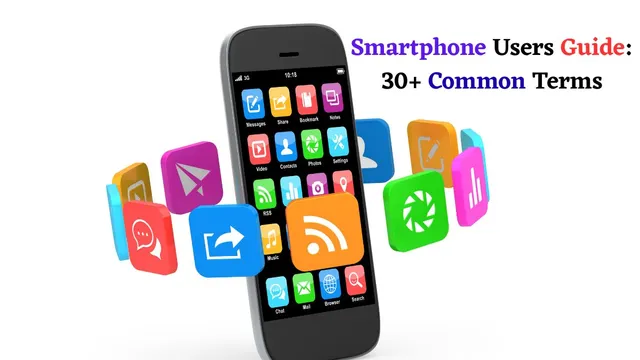- By Aditi Priya Singh
- Wed, 20 Aug 2025 07:12 PM (IST)
- Source:JND
30+ Common Smartphone Terms: Smartphones have become an important element of our lives, used for communication, entertainment, shopping and even work. In India, almost 66 crore people have a smartphone, but not all users are familiar with the common phrases and functionality that enable their device to function. We often hear words like RAM, cache, processor and operating system, but only a few individuals understand what they imply. A simple mastery of these phrases not only broadens your knowledge but also allows you to utilise your phone more successfully.
For example, knowing the difference between internal storage and cloud storage can help you avoid running out of space, whilst understanding mobile data, Wi-Fi, and hotspots can help you better manage your internet consumption. Similarly, concepts like updates, apps, and backup are critical to security and effective operation.
30+ Common Terms Every User And Beginner Should Know
In this article, we have listed 30+ popular smartphone phrases in simple language so that any user, whether new or experienced, understands their significance. This article will help you in making better decisions, maintaining your phone and having a more enjoyable mobile experience.
| Category | Term | Description |
|---|---|---|
| Hardware | Processor (CPU) | The brain of the smartphone that controls speed and performance. |
| RAM (Random Access Memory) | Helps your phone run multiple apps smoothly. | |
| ROM (Read-Only Memory) | Internal storage for apps, files, and system data. | |
| Battery Capacity (mAh) | Determines how long the phone lasts on a single charge. | |
| Display (AMOLED/LCD) | Screen type that affects brightness, clarity, and colours. | |
| Camera Megapixels (MP) | Affects the detail and quality of pictures taken. | |
| Fingerprint Sensor | A biometric security feature to unlock the phone. | |
| Connectivity & Network | Wi-Fi | Wireless internet connection for devices. |
| Bluetooth | Short-range wireless sharing and device connection. | |
| NFC (Near Field Comm.) | Used for contactless payments and quick pairing. | |
| 5G/4G/3G | Mobile network generations that impact internet speed. | |
| Hotspot | Shares mobile internet with other devices. | |
| Airplane Mode | Disables all wireless connections on the phone. | |
| Software & System | Operating System (OS) | Base software that runs the phone (e.g., Android, iOS). |
| App | A software program designed for a specific task. | |
| Update | The latest software version for better features and security. | |
| Cache | Temporary storage that helps apps load faster. | |
| Cloud Storage | Online storage service (e.g., Google Drive, iCloud). | |
| Backup | Copy of your data stored for safety and recovery. | |
| Factory Reset | Restores the phone to its original factory settings. | |
| Security & Privacy | Password / PIN | Security codes to unlock the phone. |
| Face ID | Unlocks phone using facial recognition. | |
| Encryption | Protects data from unauthorised access. | |
| Two-Factor Authentication (2FA) | Adds an extra layer of login security. | |
| Performance & Usage | Screen Resolution | The number of pixels on the display defines clarity. |
| Refresh Rate (Hz) | Speed at which the screen refreshes (e.g., 60Hz, 120Hz). | |
| Storage Expansion (MicroSD) | Adds more storage using a memory card. | |
| Overheating | When a phone gets too hot from heavy use. | |
| Multitasking | Running multiple apps at the same time. | |
| Daily Use Features | Screenshot | Captures the current screen image. |
| Notification Panel | Area showing alerts, messages, and updates. | |
| Do Not Disturb (DND) | Silences calls and notifications. | |
| Dark Mode | Uses darker themes to save battery and reduce eye strain. | |
| QR Code Scanner | A tool for scanning codes via the camera. | |
| Voice Assistant (Siri/Google Assistant) | AI-powered helper for tasks and voice commands. |
ALSO READ: 30+ Common Pageant Terms Everyone Should Know In 2025
10 Best Smart Tips For Smartphone Users
Here are 10 smart tips for smartphone users. By following these tips, you can enhance your smartphone experience, protect your data and ensure your device runs smoothly.
1. Use Strong Passwords: Protect your device with a strong password, PIN, or fingerprint scan.
2. Keep Software Up-to-Date: Regularly update your operating system and apps to ensure security patches and new features.
3. Use Two-Factor Authentication: Add an extra layer of security to your accounts with two-factor authentication.
4. Be Cautious with Public Wi-Fi: Avoid using public Wi-Fi for sensitive activities, and consider using a VPN.
5. Monitor App Permissions: Review and limit app permissions to protect your data and privacy.
6. Use a Screen Protector: Protect your screen from scratches and cracks.
7. Back Up Your Data: Regularly back up your important data to a cloud storage or external drive.
8. Close Unused Apps: Close apps you're not using to conserve battery life and reduce memory usage.
9. Use Power-Saving Mode: Enable power-saving mode to extend battery life when needed.
10. Download Apps from Trusted Sources: Only download apps from trusted sources, such as the App Store or Google Play Store, to avoid malware and security risks.

